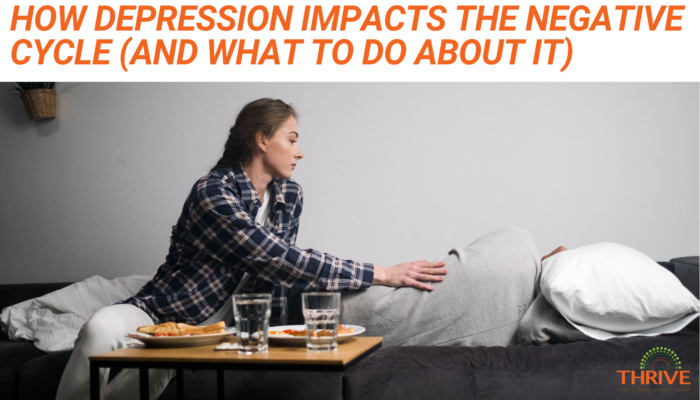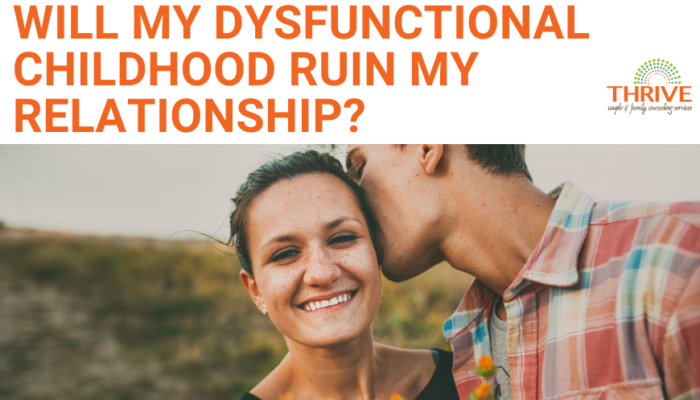Depression is one of the most common mental health disorders there is. Even though one in six American adults will be impacted by depression, it can be difficult to know what to do when you or a partner is depressed.
Depression can have a big impact on every area of life, and relationships are no exception. In fact, when one partner is depressed, it often impacts the negative cycle in the relationship which can lead to couples feeling disconnected.
Depression can also occur or worsen when your relationship is in distress. As bonding mammals, this makes perfect sense since our survival, physical health and quality of life throughout our lifetime is closely tied to whether or not our needs for connection with others is being met.
When someone is depressed, treating it with medications can only get a person so far. The gold standard for treating depression and anxiety is some kind of therapy plus medications working together.
The question is, what kind of therapy is helpful for depression? There are many different therapy modalities that can help with depression, but it may not be obvious to think about couple therapy as an excellent option for treating depression in one or both partners.
Emotionally Focused Therapy (EFT) is best known as a couples therapy modality, but it can be used with individuals as well, and increasingly has a body of research showing its efficacy in treating depression. Emotionally Focused Individual Therapy (EFIT) is used for Individual Depression treatment, and Emotionally Focused Couple Therapy (EFCT) is a great option for partners to treat depression in the context of couple therapy.
Depression may be an individual experience, but the impacts of one partner’s depression can have a serious impact on a relationship. As mentioned, the same is also true in reverse! Relationship difficulties often cause, exacerbate, or prolong depression symptoms. EFT gives couples the tools to see how depression is impacting their negative cycle, and chance to improve depression symptoms, and offers the opportunity to have emotional needs met in a safe space.
What is a negative cycle?
Emotionally Focused Therapy is different from other therapy approaches in that it helps you get a handle on the negative cycle that is happening in your relationship. All couples have a negative cycle, or a pattern of behavior that leaves you and your partner feeling disconnected from one another.
In the negative cycle, it’s one partner vs. the other, instead of both partners vs. the problem/disconnection. Someone reacts, then their partner reacts to that, and around it goes, leaving you both feeling rotten.
How does the negative cycle impact depression?
Depression and the negative cycle both impact each other. When couples are stuck in a negative pattern of interacting with each other, it can actually make depression worse and lead to becoming entrenched even further in the cycle. Think back to how you’ve felt in the past when you have problems in an important relationship. It probably has a big impact on your mental health, right? It’s hard to function when your relationships aren’t going well.
Being stressed in your relationship can cause loss of sleep, impact our appetite and eating, cause gastrointestinal problems, release stress hormones into our bodies, and long-term, can even contribute to heart disease. It is not an exaggeration to say your heart hurts when your relationship is struggling because it actually is. All of this grief over challenges and relationship turmoil can be experienced as depression.
Lastly, couples who are stuck in a negative cycle often have a hard time letting their partner in on what’s going on, so things continue on the same track and both partners feel alone and like there’s something wrong with them. This, understandably, can lead to worsening depression.
How does depression impact the negative cycle?
Depression can add to the negative cycle that couples experience. Common symptoms of depression are things like low energy, feelings of sadness or hopelessness, shame, increased crying, irritability or major mood swings, changes in sleep patterns, changes in appetite, not enjoying things you used to, inattentiveness, anger, frustration, and lowered patience.
These symptoms can be a part of the negative cycle and add to the disconnection between you and your partner. For example, some people have a very short fuse when they’re depressed and might blow up at their partner more easily than they do when they’re not depressed. Other people respond to depression by spending lots of time sleeping to escape from the painful feelings. The depressed partner might seem to withdraw from their non-depressed partner, which can be confusing and upsetting.
When your partner is in distress, it’s natural to want to help, but depression can complicate things. The non-depressed partner might be desperately trying to help but doesn’t know what will work. They might be afraid of making things worse for their depressed partner, which would make things in the relationship worse. This can lead to both partners feeling abandoned by each other – the depressed partner has withdrawn to protect themselves, and the non-depressed partner tiptoes around them, leaving them feeling abandoned instead of supported.
Let’s look at an example to understand how depression might impact the negative cycle:
Suzanne has been experiencing depression throughout her adult life. She has periods where she doesn’t seem to do much but sleep, because it can be a helpful escape from the painful feelings. She feels overwhelmed, so when she hears her partner Derek say “I miss you, how can I help?” she interprets it as “What’s wrong with you? You’ve abandoned me.” She feels a lot of shame for the way her depression is impacting their relationship, because she loves Derek. She’s terrified that he’s going to learn what’s going on in her brain and be so afraid or overwhelmed that he doesn’t love her the same way anymore. Sometimes, she becomes short with him simply because she doesn’t know how to get out of her funk.
Derek knows that Suzanne has periods of depression, but they often leave him feeling hopeless or like he needs to dance around the issue. He knows that he has needs that aren’t being met, but he worries about how Suzanne will respond to his attempts to talk, because in the past she hasn’t understood what he’s really trying to say, and she would get frustrated with him. He has found that even though he wants to help, it seems best to leave Suzanne alone when she’s like this so he doesn’t make things worse. He’s tried to show her how concerned he is by telling her he misses her and offering help, but for some reason that always makes her upset and he feels blamed for the whole thing. He’s never dealt with depression, so he feels stuck not being able to understand what Suzanne is going through.
What is driving the negative cycle that Derek and Suzanne are experiencing?
In this example, Suzanne and Derek both feel abandoned and not good enough in some way. Instead of expressing their feelings to one another, they avoid talking about it for fear of making things worse. Depressed partners often feel like they’re responsible for all the bad things in the relationship or like they’re a burden. There’s a lot of shame associated with mental health disorders, and a hallmark of depression is negative self-talk.
When you spend weeks telling yourself that you’re unlovable or that everything is your fault, you’ll start to believe it, even if part of you knows that it’s just the depression talking. Depressed folks can often be sensitive to criticism or hear requests as criticism because they feel like they’re not good enough. Depression can be so consuming that you miss the attempts your partner is making to get close to you again, or to not trust that it’s genuine.
All of this puts a lot of pressure on the non-depressed partner to hold things together, even though the depression isn’t anyone’s fault. It can be overwhelming to feel that since you’re the one with a higher level of functioning than your partner, all changes have to come from you. That can build up feelings of resentment, which helps perpetuate the cycle of not communicating needs.
Depression and the negative cycle in our example:
Though they don’t realize it yet, Derek and Suzanne’s negative cycle actually contributes to Suzanne’s depression and Derek’s sense of helplessness. She’s more depressed when she feels not good enough and ends up bottling things up, feeling hopeless. Derek sees how doing things the way they have been isn’t working, but he doesn’t know what else could help so he feels stuck and helpless.
Derek is nervous to start couples therapy because he doesn’t know how much more he can handle. He’s burned out from spending so much time worrying about Suzanne and trying to figure out how to help in a way that won’t set her off. He knows she is struggling, but he is starting to feel resentful of all the things he has to pick up when she isn’t able to function normally.
Derek is concerned that since Suzanne is so sensitive right now, that he might be asked to do the heavy lifting emotionally in therapy, and he’s not sure he is going to be able to do that on top of everything else. Worse, he doesn’t feel appreciated by her for all the ways he continues to try hard. He imagines therapy will just be more of the same – her stuck, him trying to help and failing.
How can EFT make a difference when one partner is depressed?
The idea of going to couples therapy might seem intimidating when you’re struggling or you’ve never been to therapy before. Emotionally Focused Therapy is designed for couples to get clarity on what’s really going on in the negative cycle and create new ways of reaching to one another for contact, closeness and comfort when life feels hard or someone feels low or vulnerable.
When Suzanne and Derek show up for couples therapy, they find that their counselor has lots of questions about these periods. She wants to know if Suzanne has ever formally been diagnosed with depression, or if this is something that’s been going on for a while. She wants to know when Suzanne tends to feel this way, and how it makes her feel.
Their counselor asks Derek about the impact of Suzanne’s feelings on him and how it gets in the way of them feeling connected. She spends a lot of time exploring the pattern of communication (or lack thereof) when Suzanne is feeling depressed and Derek tries to respond. The therapist uncovers a LOT of feelings that were never being discussed and came as a big surprise to both of them.
In EFT sessions, you and your partner will learn how to empathize with and validate each other.
You’ll learn how to turn toward your partner and be honest about your inner experiences. Often, relationship problems come from assuming your partner knows what you’re thinking or expecting something that hasn’t been articulated. It can feel like your partner doesn’t really know you when they don’t automatically know how to meet your needs.
In couples therapy, Derek and Suzanne learn about the negative cycle in their relationship.
Things start to make sense, and the therapist helps them realize no one is at fault, but rather, they can join forces to help themselves when a negative cycle starts to take over.
They learn their negative cycle goes like this: Suzanne feels sad and alone and like Derek can’t understand what she’s experiencing, so she doesn’t share with him. That leads to Derek really not knowing what is going on, which means he truly doesn’t know how to show up and support Suzanne. He can even see her shut down as disappointment or criticism of him, so he backs off to keep the calm, or so he thinks. That “lack of support” reinforces her belief that he doesn’t and will not understand, so she continues to not share her inner world with him. The more this goes on, the less connected they feel to one another.
The effect of being vulnerable with one another begins to help lift Suzanne’s depression as she starts to feel less alone and less like damaged goods. It actually feels wonderful to see Derek begin to share the places where he struggles. Derek starts to lean on her for support in his moments of vulnerability. Sharing helps Suzanne and Derek realize that he needs her just as much as she needs him, and that melts her heart and lets her know how important she is to him.
How can we get out of our negative cycle?
The key to stopping the negative cycle is to look at what’s going on underneath the surface. Often, the surface argument is just a stand in for the attachment fears that are being triggered. Attachment fears are the messages we send ourselves about ourselves or our relationships. These fears come from childhood experiences with our caregivers and how they responded to our needs.
Some common attachment fears are things like:
- I am unlovable
- I am not enough
- I am a burden
- I will be abandoned
- I cannot be accepted
- I will be rejected
- I don’t matter
Often, these fears aren’t conscious, or they’re difficult to pick up on. Working with an EFT therapist can help you and your partner identify the fears that are underneath your negative cycle.
How EFT helped Suzanne and Derek
It’s been so long since Suzanne and Derek had a serious talk that getting started being vulnerable seems impossible. With the help of their therapist, they learn that taking the risk to be vulnerable is what actually brings them closer together. Suzanne shares with Derek that she feels like she’s damaged goods and isn’t good enough to be in a relationship with. She tells him that she doesn’t want to show him how she really feels, because if he knew he might leave or love her less.
She remembers when she was younger that her parents weren’t great at comforting her when she was upset, and so she felt like she always had to be perfect to get their attention. Derek shares with Suzanne that it doesn’t matter to him if she’s perfect, he thinks she’s enough just as she is. He tells her that he loves her and he wants to find a way to approach this together because he’s not going anywhere.
Hearing this from each other takes off the pressure that not communicating had built up. Once Derek realizes that Suzanne is afraid of losing him, it makes more sense why she kept everything bottled up.
Suzanne sees that Derek wasn’t trying to be critical, he was just lost and didn’t know what would help. Instead of continuing the cycle of keeping each other out, they know now that the antidote to their negative cycle is being real with each other. Instead of walking on eggshells around each other, they know how to turn to one another and be vulnerable to let their partner in.
The beauty of this approach is that you and your partner learn how to be vulnerable with each other and feel safe doing so. Learning how to look underneath what’s happening to see what attachment fears are being triggered can help you interrupt the negative cycle the next time you find yourselves falling into it. When you know what the actual fears are or what your needs are, it’s easier to clue your partner in. This gives them the opportunity to be the antidote to those fears.




